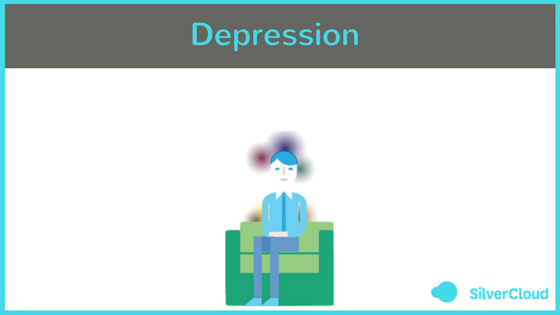We all feel sad or unhappy from time to time, sometimes because something has happened, some other times for no apparent reason. These feelings are usually short-lived and only last from a few hours to a few days. When feelings of sadness are particularly intense, accompanied by feelings of hopelessness and difficult to shake off then you may be suffering from depression. Depression can make getting on with day to day life a real struggle.
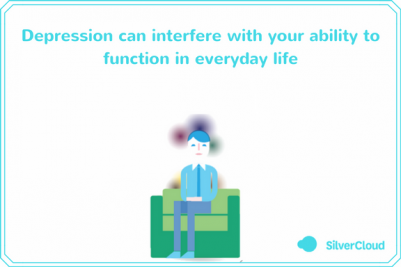
Signs and symptoms
There are many different ways in which people experience depression. While some people describe having depression as feeling like you’re drowning, or like you’re sinking in a ‘dark hole’ others may talk about feeling emotionally numb or like a shell of themselves. There are also demographic differences that can affect individuals’ experiences or how symptoms manifest; for instance men may feel irritable and restless and come across as angry rather than sad.
No matter which of the symptoms you experience the core difference between depression and sadness is that it is persistent in permeating most if not all aspects of your daily life and inhibits your ability to work, study, sleep and eat. Ultimately depression affects the way you think, feel and behave. If you have been experiencing some of the following signs and symptoms most of the time for at least two weeks, it is possible that you may be suffering from depression.
Depressive symptoms include;
- Persistent sadness and low mood
- Loss of interest or pleasure in everyday activities or hobbies that are usually enjoyed
- Low self-esteem – feelings of worthlessness and helplessness
- Decreased energy levels or fatigue
- Difficulty concentrating and impaired memory or forgetfulness
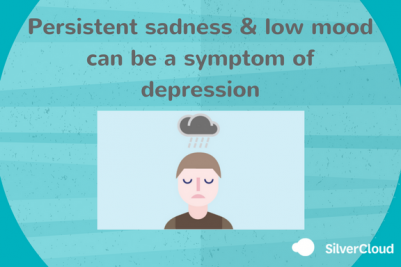
- Feeling irritable
- Sleep disturbances - having difficulty sleeping, waking early or not being able to fall asleep
- Changes in appetite — often reduced appetite and weight loss, but increased cravings for food and weight gain occur in some people
- Physical pain including headaches or muscle aches
- Having recurrent thoughts of death, suicide or self-harm
- Avoidance of social activities
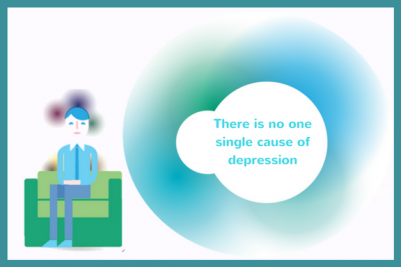
Causes
There is no single cause of depression, and there are different types of depression. In some cases people may become depressed as a result of things happening in their lives. As we go through adult life there are many other triggers for depression such as financial difficulties, serious or chronic illness, childbirth, unemployment, work stress, bullying, loss of a loved one and relationship troubles etc.
In other cases people who are more genetically predisposed to developing depression may experience a trigger which precipitates depression. Some other types of depression, such as bipolar depression, may have a stronger biological cause than other types.
Treatment
If you’re feeling depressed, it is important to seek help as there are different types of treatment available that can help you start feeling better. The first step in seeking treatment is usually to visit your GP who can recommend suitable treatment options for you.
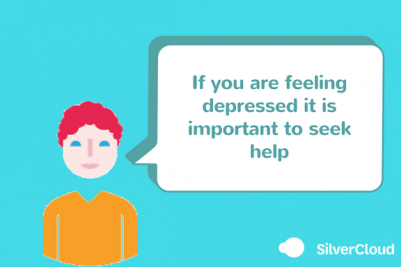
Some of the treatment options include;
CBT (Cognitive Behavioural Therapy)
CBT is all about helping you understand your current thoughts and behaviours and how they affect how you feel. While CBT does acknowledge that past experiences and influences have shaped the way you think it is all about focusing on improving the way you think, feel and behave in the present. CCBT (Computerised Cognitive Behavioural Therapy) is a form of CBT that is delivered via computer rather than face to face with a therapist. It is delivered in a series of weekly sessions and should be supported by a trained supporter. SilverCloud Health currently offers CCBT courses for treatment of depression via Improving Access to Psychological Therapies (IAPT) services.
Counselling
Counselling is a form of therapy that helps you think about the problems you are experiencing in your life to find new ways of dealing with them. Counsellors help you find solutions to problems.
Antidepressants
Antidepressants are medicines that treat the symptoms of depression. Antidepressants are not usually recommended as a first treatment for mild depression. Most people with moderate or severe depression can benefit from antidepressants, however they are not effective for everyone. Talk to your GP about the different antidepressants available.
The above suggestions are not a complete list and represent just some of the treatment options available for treating depression. We suggest that you should always seek professional advice in order to choose the most suitable option for you.







